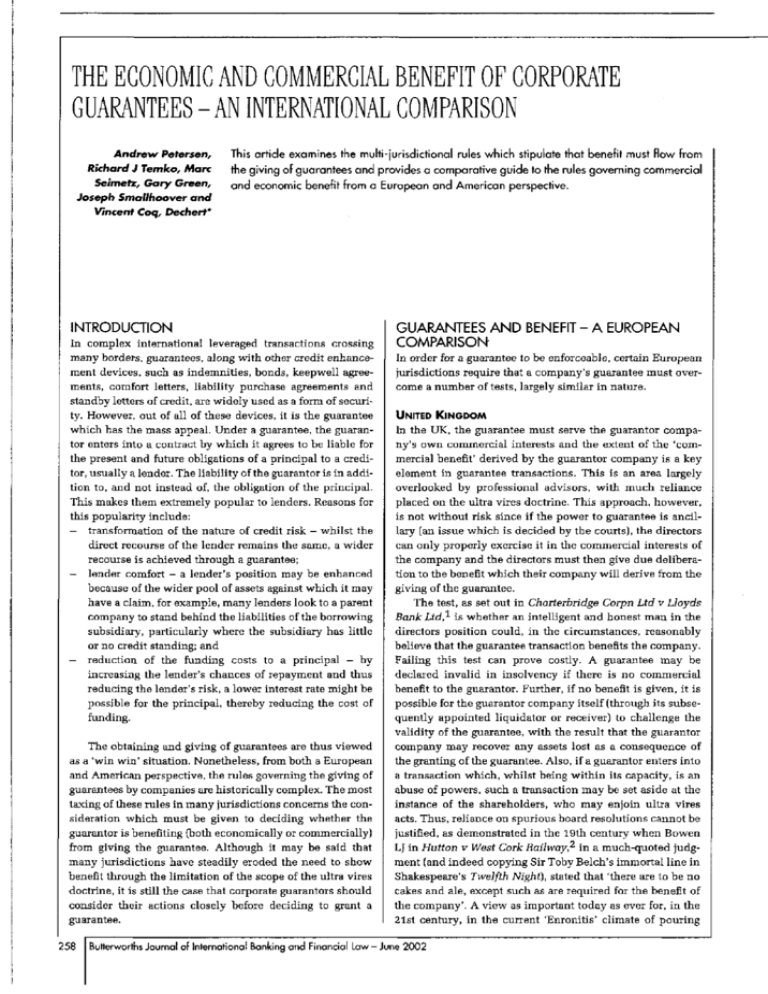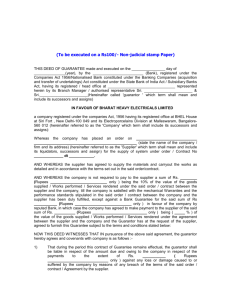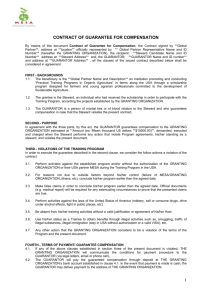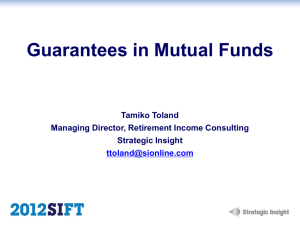the economic and commercial benefit of corporate guarantees
advertisement

THE ECONOMIC AND COMMERCIAL BENEFIT OF CORPORATE
GUARANTEES -AN INTERNATIONAL COMPARISON
Andrew
Petersen,
Richard J Temko, Marc
Seimetz, Gary Green,
Joseph Smallhoover
This article examines the multi-jurisdictional rules which stipulate that benefit must flow from
the giving of guarantees and provides a comparative guide to the rules governing commercial
and economic benefit from a European and American perspective.
and
Vincent Coq, Dechert'
INTRODUCTION
In complex international leveraged transactions crossing
many borders, guarantees, along with other credit enhancement devices, such as indemnities, bonds, keepwell agreements, comfort letters, liability purchase agreements and
standby letters of credit, are widely used as a form of security. However, out of all of these devices, it is the guarantee
which has the mass appeal. Under a guarantee, the guarantor enters into a contract by which it agrees to be liable for
the present and future obligations of a principal to a creditor, usually a lender. The liability of the guarantor is in addition to, and not instead of, the obligation of the principal.
This makes them extremely popular to lenders. Reasons for
this popularity include:
- transformation of the nature of credit risk - whilst the
direct recourse of the lender remains the same, a wider
recourse is achieved through a guarantee;
- lender comfort - a lender's position may be enhanced
because of the wider pool of assets against which it may
have a claim, for example, many lenders look to a parent
company to stand behind the liabilities of the borrowing
subsidiary, particularly where the subsidiary has little
or no credit standing; and
- reduction of the funding costs to a principal - by
increasing the lender's chances of repayment and thus
reducing the lender's risk, a lower interest rate might be
possible for the principal, thereby reducing the cost of
funding.
The obtaining and giving of guarantees are thus viewed
as a 'win win' situation. Nonetheless, from both a European
and American perspective, the rules governing the giving of
guarantees by companies are historically complex. The most
taxing of these rules in many jurisdictions concerns the consideration which must be given to deciding whether the
guarantor is benefiting (both economically or commercially)
from giving the guarantee. Although it may be said that
many jurisdictions have steadily eroded the need to show
benefit through the limitation of the scope of the ultra vires
doctrine, it is still the case that corporate guarantors should
consider their actions closely before deciding to grant a
guarantee.
258
GUARANTEES AND BENEFIT - A EUROPEAN
COMPARISON
In order for a guarantee to be enforceable, certain European
jurisdictions require that a company's guarantee must overcome a number of tests, largely similar in natiu-e.
UNITED KINGDOM
In the UK, the guarantee must serve the guarantor company's own commercial interests and the extent of the 'commercial benefit' derived by the guarantor company is a key
element in guarantee transactions. This is an area largely
overlooked by professional advisors, with much reliance
placed on the ultra vires doctrine. This approach, however,
is not without risk since if the power to guarantee is ancillary (an issue which is decided by the courts), the directors
can only properly exercise it in the commercial interests of
the company and the directors must then give due deliberation to the benefit which their company will derive from the
giving of the guarantee.
The test, as set out in Charterbridge Corpn Ltd v Lloyds
Bank Ltd,^ is whether an intelligent and honest man in the
directors position could, in the circumstances, reasonably
believe that the guarantee transaction benefits the company.
Failing this test can prove costly. A guarantee may be
declared invalid in insolvency if there is no commercial
benefit to the guarantor. Further, if no benefit is given, it is
possible for the guarantor company itself (through its subsequently appointed liquidator or receiver) to challenge the
validity of the guarantee, with the result that the guarantor
company may recover any assets lost as a consequence of
the granting of the guarantee. Also, if a guarantor enters into
a transaction which, whilst being within its capacity, is an
abuse of powers, such a transaction may be set aside at the
instance of the shareholders, who may enjoin ultra vires
acts. Thus, reliance on spurious board resolutions cannot be
justified, as demonstrated in the 19th century when Bowen
LJ in Hutton v West Cork Railway, in a much-quoted judgment (and indeed copying Sir Toby Belch's immortal line in
Shakespeare's Twelfth Night], stated that 'there are to be no
cakes and ale, except such as are required for the benefit of
the company'. A view as important today as ever for, in the
21st century, in the current 'Enronitis' climate of pouring
Butterworths Journal of International Banking and Financial Low - June 2002
THE ECONOMIC AND COMMERCIAL BENEFIT OF CORPORATE GUARANTEES - AN INTERNATIONAL COMPARISON
over directors and CEOs' actions with immense hindsight,
modern day directors need to be certain that their actions
cannot be challenged. Since, in such situations, the directors may also be breaching their fiduciary duty as directors
to act in good faith in the interest of the company and may
be liable for misfeasance, actions which could lead to them
being personally liable for any loss sustained by the company. Thus, perhaps a modern judgment would state that
'there are to be no increased share dividends payable to
directors and CEOs, except for the benefit of the company [ie
shareholders]'.
This said, advisors and directors in certain transactions,
as international groups and corporate entities become more
diverse, face a difficult task in identifying 'commercial benefit'. The circumstances in which a guarantee may be given
intra-group vary greatly. In order to ease their difficult task,
advisors to guarantors and the directors of guarantor companies should always:
- consider the trading relationship between the guarantor
company and the principal company. A decision should
then be made as to whether the relationship is sufficiently valuable to the guarantor to justify it assuming
the principal's liabilities;
- obtain consolidated balance sheets of the group in order
to determine the strength of the current and projected
financial position of the group as a whole and that of the
principal prior to any decisions being made as to the
granting of the guarantee; and
- consider the likelihood of the guarantee being called by
the guarantor. The greater the likelihood, the greater the
need to identify corporate benefit.
Moreover, in the UK, the decisions made following the
course of action set out above and the identification of commercial benefit will be determined by all the circumstances
and different considerations will apply depending on
whether guarantees have been given upstream, downstream
or cross-stream.
Having considered these questions, in the case of
upstream guarantees, the directors may identify commercial
benefit based on the fact that principal subsidiaries often
depend on their guarantor parent companies for support or
the guarantee may result in a reduction of overall funding
costs to the group where the parent incurs borrowings on
behalf of the group as a whole. Furthermore, in situations
where solvency is not an issue, it could be said that the
interests of a company are closely allied to its shareholders,
which, in the case of a wholly-owned subsidiary, means that
the interests of the subsidiary include those of its parent and
therefore the directors of the guarantor company can legitimately identify commercial benefit in this way.
In the case of downstream guarantees, commercial benefit may be identified where a parent guarantor company
guaranteeing the borrowing of its principal subsidiary
results in the payment of increased dividends or, so long as
the principal subsidiary is not a resource drain on the guarantor company, following the giving of the guarantee and
the provision of funding, the subsequent profit generated by
the principal subsidiary could justify a downstream guarantee.
In the case of cross-stream guarantees, the successful
continued trading of the other subsidiary, assuming that
they have some mutual trading relationship, or common
interest in the nature of their business or intra-group trading
or provision of services between the guarantor and principal
subsidiaries or the existence of co-sureties sharing the burdens of the guarantees resulting in a reduction of the risks
run by individual subsidiaries in entering into the crossstream guarantee may all result in a commercial benefit to
the guarantor.
BELGIUM
In Belgium, although the rules relating to validity and
enforceability of corporate guarantees have been developed
largely by jurisprudence and doctrine and occasionally
require the exercise of delicate judgment, it is generally
agreed that, in order to be permissible:
- a corporate guarantee must be within the corporate purpose of the guarantor as set out in its articles of association;
- the guarantee must correspond to a demonstrable and
commensurate corporate benefit received by the guarantor company; and
- the financial obligations of the principal assumed by the
guarantor must not be disproportionate to the financial
capacity of the guarantor.
As in the UK, the duration of the guarantee and the likelihood that it might actually be called upon are further factors that should be considered in determining whether a
specific guarantee satisfies the 'corporate benefit' test.
In the case of downstream guarantees, the second and
third criteria above would generally be deemed fulfilled to
the extent that the maximum amount guaranteed does not
exceed the lesser of the value of the guarantor's investment
in its subsidiary and the amount of the guarantor's net
assets.
In the case of upstream or cross-stream guarantees, the
second and third criteria above would generally be deemed
fulfilled to the extent that the maximum amount guaranteed
does not exceed the lesser of the portion of the funding
received by the borrower which is on-lent or otherwise
made available to the guarantor and the amount of the guarantor's net assets.
Obviously, difficult questions of judgment arise if funds
are not on-lent or otherwise made available to the guarantor,
but it may be argued that an indirect benefit accrues to the
guarantor by virtue, for example, of trading or other rela-
ButtePA'orths Journal of International Banking and Financial Law - June 2002
259
THE ECONOMIC AND COMMERCIAL BENEFIT OF CORPORATE GUARANTEES - A N INTERNATIONAL COMPARISON
tionships with the principal (the benefits of which would be
jeopardised if the principal were not granted the guaranteed
credit facility).
In practice, the management body of the corporate guarantor (ie the manager or board of directors) must determine
whether a given guarantee satisfies the relevant criteria.
Ordinarily, if a guarantee is contested as having been granted in the absence of a demonstrable and commensurate corporate benefit or in violation of the guarantor's corporate
purpose, although the guarantee itself will in principle
remain valid, a normal sanction will be that the company's
management may incur personal liability. In the case of violation of the guarantor's corporate purpose, liability will be
based on art 528^ of the Company Code, since the act will
constitute a breach of the company's articles of association
and will run to either the company or to third parties (for
example, creditors of the guarantor). In the case of disregard
of the corporate interest, liability will run to the company
and will be based on art 527'* of the Company Code which
establishes the general rule of liability for mismanagement.
In either case, management's liability can be asserted by a
bankruptcy trustee if the guarantor has become insolvent.
However, in exceptional cases in which it is demonstrated
that the beneficiary of the guarantee was aware of the ultra
vires nature of the guarantee or that the guarantee was given
with the intent to defraud creditors of the guarantor, a court
may void the guarantee itself.
FRANCE
French law, both through statute and case law, provides for
a broad spectrum of guarantees and security interests that
can be used to similar effect and serve as guarantees of third
party obligations. Whilst the Civil Code recognises the institution of suretyship as being an obligation accessory to the
primary obligation being guaranteed, case law additionally
recognises the institution of independent guarantees, which
are not covered by the Civil Code. These guarantees all have
certain fundamental requirements in common.
For a guarantee to be valid, there should, in general, be
some benefit for the guarantor company. For intra-group
financing, to determine whether a guarantor company's
decision to grant a guarantee to another company of the
same group generates benefit, it is helpful to determine
whether the guarantor is being 'fairly compensated' and that
the guarantee entails a risk that is in 'proportion to the
expected compensation'.
Moreover, except for credit institutions, whose business
it is to grant guarantees, articles of incorporation cannot
specifically set out the issuance of guarantees as part of the
corporate purpose. Since corporate purpose clauses included in the articles of association tend to be drafted in general
terms, the granting of a guarantee must be in furtherance of
an activity that is within the guarantor's company's corporate purpose.
260
Moreover, a statutory prior approval procedure must be
followed by the directors of the issuing company (if the issuing company is a societe anonyme ('SA')) who are contemplating the giving of a guarantee. This consent must be given
in relation to the validity, the amount and the conditions of
the guarantee. A simple consent in principle to the giving of
the guarantee will not be sufficient to ensure its efficiency. It
is also possible for the board of directors of an S A to issue an
annual approval authorising the president of the guarantor
company to grant guarantees. The amount of guarantees
which can be granted is then capped. For societe a responsabilite limitee, societe par actions simplifiee and societe en
nom collectif,^ no statutory prior approval of guarantees is
required. However, it is customary to have the granting of
such guarantees approved in advance by the shareholders'
meeting.
The concept of corporate interest has not been clearly
defined by statute or case law. In determining what is in the
interest of a guarantor company, it is important to note that
the law does not generally take into account the interest of
the group to which the guarantor company may belong. The
appreciation of the corporate interest will of course be different depending on whether the guarantor is issuing a
downstream, upstream or cross-stream guarantee.
In addition to a corporate interest, the guarantor company must have the financial capacity to meet its obligations
under the guarantee. Advisors to the guarantor and directors
of guarantor companies should question the granting of
such guarantee and whether the giving of the guarantee
might compromise the guarantor's financial stability and
resources for the sole purpose of serving the group's interest
and whether the guarantor would become insolvent in case
of the calling of the guarantee. In order to answer these questions in the affirmative, it is common to limit the amounts
guaranteed by a French company to a percentage of the guarantor's net worth.
A guarantee issued by a parent or grandparent company
to a subsidiary is generally easier to justify as being within
the guarantor's corporate interest.
An upstream guarantee is generally viewed as more difficult to justify, although arguments are made that failure to
issue the guarantee could result in the insolvency of the
upstream company, with subsequent nefarious effects
downstream. In addition, a specific limitation exists on the
granting of upstream guarantees since, under the prohibition of financial assistance, French subsidiaries may not
advance funds or provide guarantees or security with a view
to facilitating the purchase or subscription of its own shares.
This often provides obstacles in the context of the leveraged
buy out of a target company by a holding company.
Cross-stream guarantees are also problematic for much
the same reasons and the lack of a direct capital link can be
viewed as exacerbating the problem.
Decisions made in violation of the corporate interest
Butterworths Journal of International Banking and Financial Law - June 2002
THE ECONOMIC AND COMMERCIAL BENEFIT OF CORPORATE GUARANTEES - A N INTERNATIONAL COMPARISON
may be cancelled, notably by aggrieved shareholders (in the
French equivalent of a derivative suit) or bankruptcy administrators. In addition, directors of the guarantor company
^Nh.o made a decision contrary to the interests of the company which results in loss may be held liable and may, in certain cases, be subject to criminal sanctions.
Directors and managers may also be prosecuted for misappropriation of corporate funds and/or credit if 'acting in
bad faith, they have used the company's property or credit
in a manner which they knew to be contrary to the interests
of the company for personal ends or for the benefit of another company in which they have a direct or indirect interest'." Directors and managers^ may be held criminally liable
and be punished by imprisonment*' and fines. In this
respect, for the offence to be constituted, the directors or
managers would have to have a direct or indirect interest in
the company(ies) which benefit from the guarantee. The
directors or managers' bad faith would have to be established as well. Finally, the guarantee would also have to be
contrary to the corporate interest and exceed the corporate
capacity of the guarantor. Thus, to determine whether there
is a breach of interest in the context of misappropriation of
corporate funds or credit, the courts take into account the
interests of all the companies in a group to a certain extent.
With respect to loans and guarantees granted by a company
to another in the same group, the Criminal Chamber of the
Court of Cassation (the highest criminal court) (see Affaire
Rozenblum)^ has established a set of three conditions that,
if satisfied, would save the transaction from being held to be
a misappropriation of corporate funds or credit:
- the two companies have to belong to the same group,
which means that structural links exist between the
companies of the group and a common strategy for a
common goal;
- the operations have to be motivated by a common social,
economic or financial interest to be assessed in view of
the policy for all the group; and
- the financial risk taken by the guarantor has to be compensated, has not distorted the existing balance between
the different undertakings of the companies or has not
exceeded its financial capacity.
It is important to note that these conditions are to be
applied in all intra-group contractual relationships.
Moreover, since the misappropriation of corporate funds or
credit constitutes a criminal offence, legal action could be
initiated by the public prosecutor and any third party suffering any loss. In addition, the statutory auditors would be
liable if they do not disclose such misappropriation discovered during their audit.
LUXEMBOURG
Many of the Luxembourg rules governing the granting of
guarantees have similarities with those already discussed in
respect to France and Belgium and, as we shall see, the US.
Generally, Luxembourg companies are in principle free to
give guarantees and act as guarantors subject to a certain
number of limits:
- a corporate guarantee must be within the 'corporate purpose' of the guarantor as set out in its articles of incorporation. These are very wide and the corporate purpose
of a Luxembourg company is usually drafted in such a
manner to allow the company to have as much freedom
as possible, which allows it to do almost an)rthing in
relation to its statutory activity. A cross-stream guarantee will less often be clearly within the corporate purpose than downstream or upstream guarantees as the
benefits of the granting of the guarantee may be less
obvious and certain companies may even be prohibited
from granting such guarantees as mentioned below; and
- the guarantee must be granted in accordance with the
articles of incorporation which may, for instance, subject the granting of a guarantee to specific approval procedures (for example, approval of the meeting of shareholders).
In addition to the above limits, it is generally agreed that
the potential financial obligations should only be assumed
by the guarantor if they are undertaken in its own interest
(be it direct or indirect). A guarantee should, in principle,
not be disproportionate to the financial capacity of the guarantor as otherwise the entering into the guarantee could
prove to be prejudicial towards the guarantor or third parties (for example, creditors of the guarantor).
Furthermore, certain types of companies are subject to
particular rules, which, whilst not preventing them from
acting as guarantors per se, nonetheless limit the beneficiaries of the guarantee (for example, limited to companies in
which they directly hold at least 10 per cent of the share
capital).
The specific criteria that may be applied to downstream,
upstream or cross-stream guarantees, in case of litigation
before a Luxembourg court, are similar to the ones used in
Belgium and France. However, any potential guarantor companies who wish to give guarantees must respect the limits
set out above.
Faced with wide articles of incorporation, it generally
falls to the managing body of the corporate guarantor to regulate what is or is not a permissible activity of the company,
as well as to authorise the entering into the relevant guarantee by the company.
The managing body has to act with due care since if a
guarantee is considered to have been granted in violation of
the guarantor's articles of incorporation, the sanction will be
that the management body will be held personally liable.
Furthermore, whilst it is possible for the granting of the
guarantee not to violate the company's object, it could,
depending on the circumstances, be considered an error in
Butterworths Journal of International Banking and Financial Law - June 2002
261
THE ECONOMIC AND COMMERCIAL BENEFIT OF CORPORATE GUARANTEES - A N INTERNATIONAL COMPARISON
management, in which case the managing body may also be
held personally liable. In both cases, the liability of the managing body would be of a civil nature and would be very
similar to the one under Belgian law.
It can be noted that it is considered that the liability of
managers/directors provided for by arts 59 and 60 (relating
to stock corporations - societes anonymes] and art 192
(relating to limited liability companies - societes a responsabilite limitee] of the law dated 10 August 1915 on commercial companies, as amended, is one of public order and cannot therefore be limited by agreement.
As far as the actual guarantee is concerned, it will in
principle remain valid and any loss suffered by the company will be borne by the managing body if the latter is held
liable. As in the US, Belgium and France, in exceptional
cases, the guarantee may be annulled by a court, for example, if a company was forced to grant a guarantee or if there
was fraud.
GUARANTEES AND BENEFIT - A N AMERICAN
PERSPECTIVE
In the US, over recent years, the concerns about corporate
guarantees have largely shifted from the question of enforceability under corporate law to issues which are raised under
federal bankruptcy law and related state law provisions
relating to fraudulent transfers.
Statute has a large part to play and almost all state corporation law statutes give express permission to guarantee
obligations (see s 3.02(7) of the Model Business Corporation
Act and s 1.22(13) of the Delaware General Corporation
Law). Although it is still necessary for the guarantee to serve
a 'corporate purpose', the criteria of what serves a corporate
purpose are very liberal and are only limited by 'good faith'
and the exercise by the board of directors of 'reasonable
business judgment'. As we have discovered, pre-Enron, predictably, the business judgment of directors was rarely challenged and shareholders consent to the guarantee was
always available to remove any basis for challenge. This was
easily obtained in corporate group transactions where the
corporations share common ownership. Nonetheless, one
wonders if we will see a situation, post-Enron, where the
actions of directors are more closely examined, resulting in
an increase in challenges to the effectiveness of guarantees,
particularly upstream and cross-stream guarantees, based
on their characterisation as fraudulent transfers.
The determination of a fraudulent transfer is governed at
state level by the Uniform Fraudulent Conveyance Act
CUFCA') or the Uniform Fraudulent Transfer Act ('UFTA')
and at federal level by provisions of the Bankruptcy Reform
Act 1978 ('the Bankruptcy Code'). Under the Bankruptcy
Code, a transfer is deemed fraudulent and can be set aside
within one year of bankruptcy if the guarantor receives less
than 'reasonably equivalent value' in a transaction and, at
the time of the transfer (ie the time the guarantee was made).
262
was insolvent or rendered insolvent by the transfer, was
under-capitalised or rendered under-capitalised by the
transfer or was unable, or rendered by the transfer unable, to
pay its debts when they matured (11 USC 548). The constructive fraud provisions of the UFCA and UFTA are substantially similar, with longer periods available to set aside
transactions.
In the case of downstream guarantees, the courts have
generally found that these do not raise constructive fraud
issues under fraudulent conveyance laws because the parent is deemed to receive value when it guarantees obligations of its subsidiary since it owns the subsidiary.
Upstream and cross-stream guarantees present more difficult problems. If a subsidiary guarantees all of the indebtedness of its parent and has received, in the way of a loan or
capital contribution from the parent, essentially all or a proportionate share of the proceeds of the indebtedness, there
is no issue. However, in many cases where upstream and
cross-stream guarantees are given, some subsidiaries receive
only a small part of the loan proceeds or receive none at all.
In such cases, it is left up to the courts to decide whether a
reasonably equivalent value has been received and, if it has
not, whether the guarantee has rendered the corporate subsidiary insolvent within the definition of the applicable law.
In determining the existence of a fraudulent conveyance, the courts, in a similar approach to Belgium, have
acknowledged that indirect benelits received by a subsidiary may be reasonably equivalent value for the guaranteeing of its parent's debt or the debt of an affiliated company. A leading case in this area is Rubin v Manufacturer's
Hanover Trust Co,^^ where a group of corporations bought
and sold money orders in a complicated inter-group system
and the lender only made loans to certain members of the
corporate group. It was held that the cross-stream guarantees were supported by 'fair consideration' because all the
companies in the network operated as a group and possessed an 'identity of economic interest'.
Other court decisions have approached the solvency
side of the determination by reducing the potential liability
under the guarantee by postulating that if the guarantee is
called, the parent and other affiliated corporations will
potentially have assets to share in meeting the overall liabilities (see Re Xonics Photochemical Inc).^^
In a similar approach to French law, many US lenders
also play a part in maximising the protection offered by
guarantees by further reducing the risk of a guarantee being
deemed a fraudulent conveyance. They achieve this by
including language in their guarantee agreements which
limits the obligation under the guarantee to an amount
which would not have rendered the guarantor insolvent at
the time the guarantee was made. Whilst this approach has
the disadvantage of potentially limiting the amount which
might be available from a guarantor as its net worth increases and leaves open the question of how much of the guaran-
Butterworths Journal of International Banking and Financial Law - June 2002
THE ECONOMIC AND COMMERCIAL BENEFIT OF CORPORATE GUARANTEES - A N INTERNATIONAL COMPARISON
tor's assets are available to be called upon, it decreases the
possibility that the guarantee will be determined to be
invalid. With this in mind, in order to maximise the amount
of such assets from the guarantors within the corporate
group, lenders frequently require the principals who are coguarantors to enter into contribution agreements harnessing
any additional potential assets available. Any guarantor
who is required to pay substantial additional amounts can
call upon the other principals in the group to share payment
for the excess amount.
Furthermore, in some cases where the lender of a revolving credit lends amounts which will be shared by the entire
corporate group to fund operating activities and a term
lender lends to one company and receives guarantees from
the others, an inter-creditor agreement is entered into
among the revolving and term creditors to ensure that the
revolving creditor (with a lesser fraudulent conveyance risk)
will share pro rata any proceeds it receives in excess of
those received by the term lender, thus reducing the greater
fraudulent conveyance risk of the term lender.
CONCLUSION
Having undertaken a comparative approach, it may be seen
that there is a general consistency in each jurisdiction that,
in certain circumstances, the directors are personally liable
for any mismanagement of the company's affairs when it
comes to the granting of guarantees. Statute, however, does
seem to have dictated that generally directors will act in the
interest of the company and the extent that the comts are
willing to step in and make this ruling appears to be limited.
The approach, when taken, seems to be to rule against the
directors first and then consider if the guarantee is to be
declared void or invalid. Only the UK seems to divert from
this approach, where it may be seen that the UK com-ts are
more willing to declare a guarantee invalid before ruling on
the directors' personal liability. What will be interesting in
the future, however, is whether and to what extent the
shareholders of a company will no longer consider that the
directors have the company's interest at heart and demand
that a real benefit be shown to them.
In summary, this article has demonstrated the protection
that guarantees may offer lenders if coupled with sufficient
corporate benefit. There may be a focus on the fiscal aspects
of benefit and value as in continental Europe and the US or
on the commercial benefit as in the UK. Either way, as long
as this determination is made, a guarantee may afford maximum protection to lenders and can truly be viewed as a necessary credit enhancement device with a vital role to play in
many international leveraged transactions.
* Dechert is an international law firm with 12 offices throughout the
United States, the United Kingdom and contiuental Eiurope. Andrew
Petersen is counsel in the banking department of the London office
speciahsing in cross-border acquisition finance and corporate
restructuring. Richard J Temko, Marc Seimetz, Joseph Smallhoover
and Gary Green aie all partners specialising in all aspects of banking
and finance in the Belgian, Luxembourg, Paris and Philadelphia
offices respectively. Vincent Coq is a corporate associate focusing on
banking and finance in the Paris office.
1 [1970] Ch 62.
2 (1883) 23 ChD 654.
3 This article is applicable to directors [administrateurs/beheerders]
of stock corporations; the corresponding article applicable to
managers [gerantsizaakvoerders) of limited liability companies is art
263 of the Company Code.
4 The corresponding article applicable to limited liability companies
is art 262 of the Company Code.
5 A commercial partnership which has legal personality.
6 Article L 242-6 of the Commercial Code.
7 A similar text exists applicable to gerant of a societe a responsabilite
Umitee which is art L 241-3 of the Commercial Code.
8 Imprisonment for up to five years and/or a fine of up to 380,000
euros.
9 Cour de Cassation, Chambre Commerciale, 4 February 1985. This
decision originally concerned the granting of loans, but was
extended to the granting of guarantees.
10 661 F 2d 979 (2nd Cir, 1981).
11 841 F 2d 198 (7th Cir, 1988).
This Journal should be cited as follows:
(2002) 6 JiBFL [page
no]
Butterworths Journal of International Banking and Financial Law - June 2002
263







